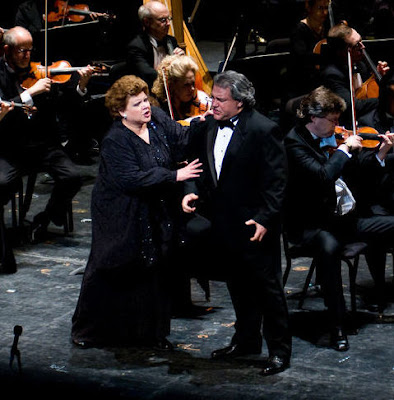 Dolora Zajick and Salvatore Licitra in Cavalleria Rusticana, Washington National Opera, photo by Leah L. Jones |
Mascagni's over-performed, bite-sized piece of verismo pablum (pace Opera Chic) is neither of those things (although WCO also resorted to Cavalleria a few years ago). The initially disappointing sales for these performances seemed to indicate that even the often unadventurous Washington audience had voted it down. The slate of singers, however, had to give anyone pause, as it included two important names in this sort of repertory. The Sunday afternoon performance removed any doubt, and as much as it may surprise you to hear it from me, anyone who loves great singing, such as we do not hear all that often here in Washington, should find a way to hear the only remaining performance, on Friday night.
There is no point in arguing about the value of the work: those who love it, love it, and vice-versa. If sung and played well, as it was here, its emotionally crude appeal can pack a punch. American mezzo-soprano Dolora Zajick, in her regrettably late company debut, sang with a voice that was a stunning force of nature. The few times that she sang directly toward me, it was like a torpedo of sound. That vocal bludgeon was deployed only at emotional high points, mixed with a range of vocal qualities, like the lines drawn by a quill, from razor-sharp to thickly inked. Zajick has rightly earned a reputation for this role, as well as even more forceful and demanding ones, like Verdi's Azucena and Amneris.
Anne Midgette, Mezzo-Soprano's Glorious Debut Lifts 'Cavalleria' (Washington Post, May 27) Tim Smith, An intense performance of 'Cavalleria' (Baltimore Sun, May 27) T. L. Ponick, Salute to 'Chivalry,' masters (Washington Times, May 27) |
Baritone Gordon Hawkins seemed much less at ease in this role than he did recently as Rigoletto. He stumbled over the Italian and elided or otherwise missed many entrances and cutoffs, but the frame, both vocal and physical, was right for the role. Conductor Riccardo Frizza did his best to keep the ensemble on track but occasionally seemed overwhelmed. Madeleine Grey and Leslie Mutchler were good in the supporting roles of Mamma Lucia and Lola, respectively. The WNO Orchestra, raised up to the stage level from its pit, gave its usual workmanlike performance, with lovely solos from the flute in the introductory scene, a terrible electronic organ, and a violin sound that needed some burnishing. The opera was introduced by an orchestral first half, overtures and instrumental pieces from Mascagni and other Italian opera composers.
The only other performance of Cavalleria Rusticana is scheduled for Friday evening (May 30, 7:30 pm). A few tickets, mostly the expensive ones, remain.
No comments:
Post a Comment